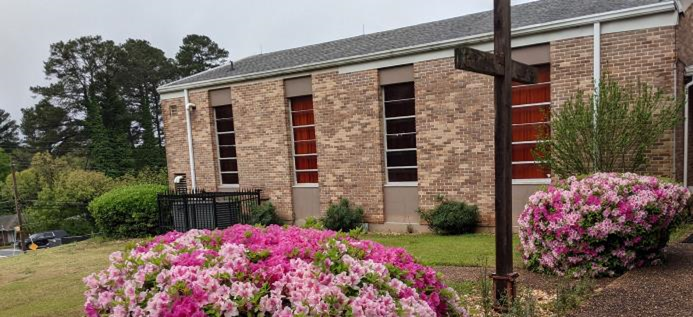Episodes

Thursday Feb 16, 2023

Thursday Feb 16, 2023

Tuesday Oct 18, 2022
10-03-2021 - Kevin Goins - The God Who Sees Proverbs 5
Tuesday Oct 18, 2022
Tuesday Oct 18, 2022
“The God Who Sees”
Proverbs 5:21-23
For most of Proverbs 5 Solomon has laid out all the natural consequences of fulfilling our sexual desires in the wrong way. With verses 21-23, however, he brings God into the picture. His point is that when we give into sexual temptation, it is not only the physical, emotional, and relational dimension of our life which will suffer. So also, our relationship with God will suffer. Why should we honor God with our sex life and with our thought life? We find the answer to this question in our text today.
I Many times in the Bible the marriage relationship is used to illustrate our relationship with _______________.
A. Why?
1. The marriage relationship and our relationship with God are the most intensely p__________________ relationships we can have.
2. Our relationship with God and our relationship with our spouse are the only mutually e____________________ relationships that human beings can have.
B. God’s concern is not blind; God sees, not only our actions, but even the t_________________ which lie behind our actions.
II Why should we be concerned, not only about our actions, but about our thoughts and everything that makes up our p______________ life? Why? Solomon gives us three reasons:
A. First, we should honor God with our sex life, and with our thought life, because all of our life is lived in f_________ v___________ of the Lord (5:21).
1. The best reason for saying No to sexual temptation is because God’s e________ are always on us and he sees all we think and do.
2. If this life is all there is, then our sex does not have to be m_______________, it only needs to be s_____________________.
3. When Solomon says, “He examines all [our] paths,” the Hebrew word which is translated “paths” actually means w_______________ t________________ - which is another way of saying that God sees all our h_____________________, both the good and the bad.
4. Knowing that God sees us should not only motivate us to avoid w____________, but it should also motivate us to do r______________.
5. There is an inverse relationship between faith and sexual temptation: faith can motivate us to say __________ to sexual temptation, or the desire to say _________ to sexual temptation can motivate us to say No to faith.
B. Second, we should honor God with our sex life, and with our thought life, because repeated disobedience locks us in a p____________________ from which it is very hard to e__________________ (5:22).
1. One of the greatest ironies of life is that we see sin as the means by which we can gain f___________________________.
2. When we look to anything or anyone other than God to make us free, we turn that thing into an ____________________.
3. When we give our w____________________ to things that are not God, it drives us away from God, and since God is the only source of freedom, this idolatry enslaves us even ________________.
C. Third, we should honor God with our sex life, and with our thought life, because lack of discipline is d__________________________ (5:23).
1. Old Testament scholar Bruce Waltke says discipline includes two things:
a. First, discipline requires t_________________________.
b. The second part of discipline is the difficult work of l______________ in the way we have been taught to live.
2. When we listen to the truth of God’s Word, and we live it as we were taught, we experience spiritual w___________________________.
-But when we know the truth, and we do not live in harmony with that truth, then we experience spiritual b______________________________.

Tuesday May 10, 2022
09-26-21 - Kevin Goins - 5 Surprises in the way God views sex, Part 2
Tuesday May 10, 2022
Tuesday May 10, 2022

Tuesday May 10, 2022
09-19-21 - Kevin Goins - 5 Surprised in the way God views sex Part 1
Tuesday May 10, 2022
Tuesday May 10, 2022

Tuesday May 10, 2022

Tuesday May 10, 2022

Tuesday May 10, 2022

Thursday Aug 26, 2021
08-22-21 Kevin Goins - Managing Sexual Desire part 2
Thursday Aug 26, 2021
Thursday Aug 26, 2021
“Managing Sexual Desire” (part 2)
Proverbs 5:3-4
Some people have the idea that Christians never discuss sex, or, if they do, this discussion must take place behind locked doors. If that is true, then it is a shame that no one communicated this rule to the authors of the Bible. God created sex, and in his creation mandate he made sure that the human race can only flourish if sex flourishes. Since God obviously finds great value in human sexuality, we need to make sure we see our sex life from his perspective. This is especially true when it comes to how we manage our God-given sexual desire.
I It may be helpful to start off with an outline of chapter 5, so we have an idea where Solomon is going:
A. First, verses 3-6 focus on ______________ we should say “No” to sexual temptation.
B. Second, verses 7-14 tell us ___________ we can say “No” to sexual temptation.
C. Third, verses 15-20 continue Solomon’s advice about how to say “NO” to sexual temptation, but from a very d_______________ point of view.
D. Finally, verses 21-23 answer the question about why we should say “No” to sexual sin, but this time from _____________ perspective.
II Why should I manage my sexual desires? Because listening to sweet words of sexual temptation can result in a very _________________ life (5:3-4).
A. First, there is an issue we must deal with, and that is how many _____________________ see Proverbs chapter 5.
1. Many see in this chapter a patriarchal view of sex in which ______________ are always the victims and __________________ the victimizers.
2. But to see Proverbs in a more accurate way, we need to recognize these four points:
a. First, this book was written, not just for _______________, but for ______________________ as well.
b. Second, Solomon is writing about a sexual predator who was a woman, but that does not mean that in his mind o____________ women can be sexual predators.
c. Third, there is no doubt that the woman depicted in Proverbs 5 is an example of folly or foolishness, but Proverbs also depicts ___________ as a woman.
d. Fourth, there is a simple reason why Solomon talks about the adulteress (female) in chapter 5, and it is because Solomon’s concern is for his ______________.
B. What is wrong with this woman Solomon describes in verses 3-4?
1. First, __________ is she?
a. The Hebrew text calls her “the _________________ woman.”
b. She is strange for two reasons:
1. First, she does not live by the ____________ standards of Israel.
2. Second, she is strange because she is not a female r____________ of Solomon’s son.
c. The really strange woman was the a____________________ or prostitute.
d. There is something else about who she is: she may or may not be beautiful, but she does not ____________________ on her beauty to get what she wants.
2. Second, ______________ does she do?
a. The Jewish Old Testament scholar Michael Fox says that l___________ are the problem here, and l____________ are the only solution.
b. The strange woman uses her lips to f_______________ and manipulate the young man, hoping to persuade him to commit adultery.
c. The only way the son will escape her trap is if he uses his lips to counter her deceptive words with words of d____________________________.
d. The strange woman, or man, was an exception in Solomon’s day, but today he or she has become the n_________________.
3. Third, to what do her actions _________________?
a. When the young man does what the strange woman wants, the result is the complete _________________________ of his life.
b. Solomon’s point is that though this woman pours out honey with her lips, inside she is nothing but ______________________.
c. The woman’s temptation -- if the son yields to it -- will result in some kind of ______________________.

Wednesday Aug 18, 2021
08-08-21 Kevin Goins - 4 Keys to Managing Sexual Desire
Wednesday Aug 18, 2021
Wednesday Aug 18, 2021
“Four Keys to Managing Sexual Desire”
Proverbs 5:1-2
Some people have the idea that Christians never discuss sex, or, if they do, this discussion must take place behind locked doors. If that is true, then it is a shame that no one communicated this principle to the authors of the Bible. God created sex, and in his creation mandate he made sure that the human race can only flourish if sex flourishes. Since God obviously finds great value in human sexuality, we need to make sure we see our sex life from his perspective. This is especially true when it comes to how we manage our God-given sexual desire.
I Not only is Proverbs chapter five focused on the subject of sex, but so also are the following ___________ chapters.
A. That is really not surprising, for two reasons:
1. Solomon knew from experience how the inability to manage one’s sexual desires could cause __________________.
2. It is not surprising that Solomon devotes so much attention to sexual desire because he is writing to his y___________________ s______________.
B. So, what is Solomon doing in chapter five? He is trying to teach his son how to m______________ his sexual desire.
-Solomon makes _____________ points in these two verses:
II First, we will never manage our sexual desires unless we are willing to __________________ to wisdom (5:1a).
A. What is unique about verse one is that Solomon is saying, “Of all the wisdom which God has given to me to give to you, this is a wisdom that I have seen p________________ true in my own life and experience.”
B. In other words, Solomon is not speaking t______________________________ here.
c. Every parent’s desire is that our children learn from our mistakes rather than r____________________________ them.
II Second, we will never manage our sexual desires unless we are willing to take r____________________________________________ (5:1b).
A. The point is: there is a time in life when it is appropriate to think about pursuing an intimate relationship, and there is a time when it is not appropriate, and both the _______________ and ________________ are agreed on this.
B. According to the WHO, each year around the world 770,000 adolescent girls under the age of ___________ get pregnant.
C. Solomon is c__________________ his son to realize the awesome responsibilities that come with sex.
III Third, we will never manage our sexual desires unless we learn to practice d_________________________________ (5:2a).
A. Solomon is asking his son to listen to his teaching so he can develop the ability to make g__________ j______________________ about relationships.
B. Discretion weighs the pros and cons, both in the p___________________ sphere of life and in the m____________________ sphere of life.
C. Discretion means not behaving like an animal with nothing but i___________________ and u______________________ to guide us.
IV Fourth, we will never manage our sexual desires unless we learn how to manage our s_______________________________ (5:2b).
A. Illicit sexual encounters do not happen without ____________________.
B. The generation that is a________________ or a__________________ to talk about sex is, in some measure, responsible for the sexual immorality of the next generation.
C. According to a 2019 survey done by the Institute for Family Studies, among male and female never-married Evangelicals between the ages of 18 and 22, _________% have engaged in sexual intercourse.

